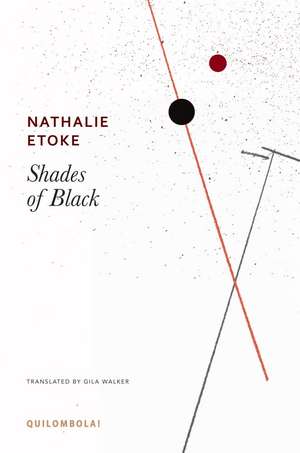Shades of Black: Quilombola
Autor Nathalie Etoke Traducere de Gila Walkeren Limba Engleză Hardback – 20 apr 2021
Situated at the crossroads of three countries—Cameroon, France, and, now, the United States—Nathalie Etoke is uniquely positioned for this polyphonic reflection on race. She examines what happens when race obliterates historical, social, cultural, and political differences among populations of African descent from different parts of the world. Focusing on recent and ongoing topics in the United States, including the murder of George Floyd, police brutality, the complex symbolism of Barack Obama and Kamala Harris, Etoke explores the relations of violence, oppression, dispossession, and inequalities that have brought us here, face to face with these existential questions: Are you breathing? Are we breathing?
Preț: 83.81 lei
Preț vechi: 95.29 lei
-12% Nou
Puncte Express: 126
Preț estimativ în valută:
16.04€ • 17.42$ • 13.47£
16.04€ • 17.42$ • 13.47£
Carte indisponibilă temporar
Doresc să fiu notificat când acest titlu va fi disponibil:
Se trimite...
Preluare comenzi: 021 569.72.76
Specificații
ISBN-13: 9780857428530
ISBN-10: 0857428535
Pagini: 144
Dimensiuni: 152 x 229 x 20 mm
Greutate: 0.4 kg
Editura: Seagull Books
Colecția Seagull Books
Seria Quilombola
ISBN-10: 0857428535
Pagini: 144
Dimensiuni: 152 x 229 x 20 mm
Greutate: 0.4 kg
Editura: Seagull Books
Colecția Seagull Books
Seria Quilombola
Notă biografică
Nathalie Etoke is associate professor of Francophone and Africana studies at the Graduate Center, City University of New York. She is the author of Melancholia Africana: The Indispensable Overcoming of the Black Condition. Gila Walker is the translator of more than a hundred books and articles from French. She lives in New York City and France.
Cuprins
1. LIVING IN BLACK AND WHITE
2. TO BE SITUATED
2.1 Where Are You From?
2.2. Black Immigrant Woman
3. SHADES OF BLACK: “ADOS” VERSUS BLACK NON-DESCENDANTS OF AMERICAN SLAVERY
3.1 Barack Obama: Symbolic Power of Evocation and Denial of the Black Condition
3.2 Kamala Harris: Black Identity and Political Opportunism
3.3 Black Screen: Brits versus ADOS
3.4 Capitalism, the American Dream, and Liberation
4. DECOLONIZING FREEDOM
5. EPILOGUE: George Floyd
2. TO BE SITUATED
2.1 Where Are You From?
2.2. Black Immigrant Woman
3. SHADES OF BLACK: “ADOS” VERSUS BLACK NON-DESCENDANTS OF AMERICAN SLAVERY
3.1 Barack Obama: Symbolic Power of Evocation and Denial of the Black Condition
3.2 Kamala Harris: Black Identity and Political Opportunism
3.3 Black Screen: Brits versus ADOS
3.4 Capitalism, the American Dream, and Liberation
4. DECOLONIZING FREEDOM
5. EPILOGUE: George Floyd
Recenzii
"Etoke’s Cameroonian, French, and US background provides her with interesting and insightful perspectives to study the African diaspora and the 'capitalist behemoth’s' role in helping shape and sustain today’s race relations. Etoke examines white/Black relations, the nativist perceptions of ADOS (American descendants of slavery) and their interactions with Black immigrants from the Caribbean (descendants of slavery but excluded from ADOS) and sub-Saharan Africa, and the social and economic disparities within the non-ADOS population. This divisiveness is contrary to the pan-African liberation dream of W. E. B. Du Bois, Stokely Carmichael, and others. The exceptional ADOS individuals who achieve visibility and acceptability are those who serve as 'fetishes of diversity'; Etoke writes that they cannot transform the system because they are part of it, rather acting like fig leaves hiding systemic racism. This charade is produced by the 'diversity industry' in addition to slave tourism, 'racist antiracism,' and other activities and ideologies that support white American masculinity (MAGA’s 'color of nostalgia' is white). Adeptly translated from Etoke’s French by Walker, this is an important reflection on the role of race, gender, and nationality in US society, politics, and culture. . . .Recommended."



